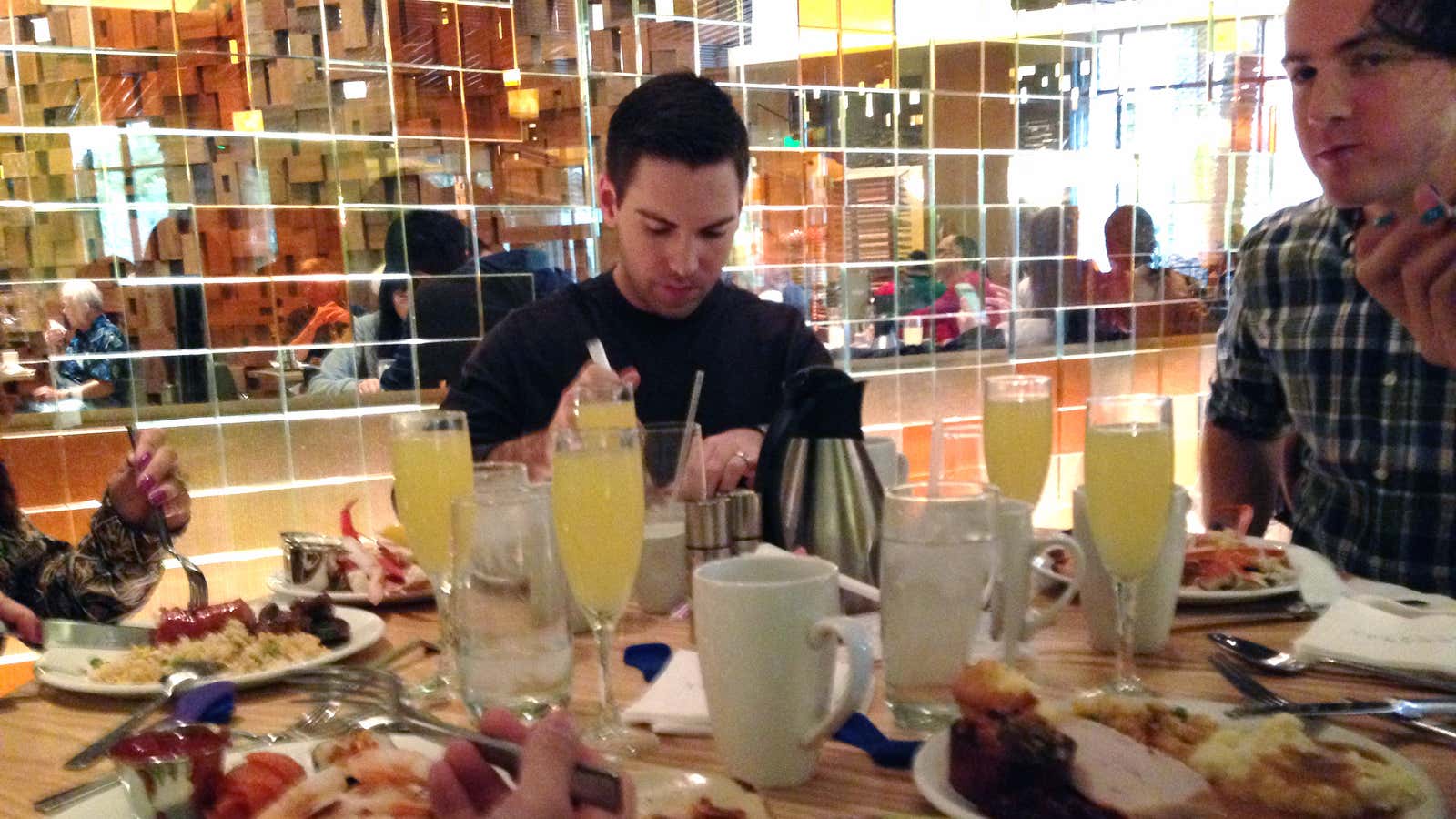With Thanksgiving just around the corner, Americans are gearing up for their favorite traditions: Turkey Trots, marshmallow-topped sweet potato casseroles, annual viewings of A Muppet Christmas Carol–and, of course, dodging questions about the future.
If you’re in your 20s or 30s, or ever have been, you’ve almost certainly encountered a parental unit, curious aunt, or well-meaning grandfather whose hapless question during the holidays sent you into a spiral of self-doubt. But there’s a simple solution that can make us all happier, more secure and less likely to sneak away to the guest bathroom to sob into a pilgrim-patterned hand towel. Pay attention, parents, uncles, aunts, grandparents, and elders of America: Stop asking young people about their plans.
An informal poll of my Facebook friends suggests that people’s most-dreaded questions from family members tend to fall into three categories: work, relationships, and children. A sampling:
“Do you think you’ll get married?”
“Are you dating anyone?”
“‘Who’s your friend?’ (This is followed, when I am single next year, with ‘Where’s your friend?’)”
“When can we expect Baby [last name here]?”
“Why hasn’t your toddler been weaned yet?”
“When do you think you’ll get a real job again?”
“What are you going to do with your degree in [any non-STEM field]?”
“So are you finally done with school?”
“Since the job market is so bad, have you thought about teaching in South Korea?”
At the root of these questions is a concern with whether the person under scrutiny is on the path to achieving familiar life milestones. This can feel unfriendly if the underlying assumption is that we ought to be further along on the path than we are—or that marriage, babies, and the like are mandatory rather than optional.
But here’s the thing: a lot of the time, the oblivious relative asking these questions isn’t even that invested in the answers! He’s just trying to make conversation. Which is sort of like belly-flopping into the middle of a glass table piled high with Waterford crystal wine glasses and then being like, “What.” But our second cousins and great-aunts don’t know they’re doing that. They think they’re behaving like dinner guests on Downton Abbey. (Actually, they kind of are behaving like dinner guests on Downton Abbey–have you ever noticed how many of those dinners devolve into name-calling, mean-spirited double entendres and napkin-throwing hasty exits?)
It’s also useful to keep in mind that all of us have stumbled into this kind of emotionally fragile conversational territory at one point or another. We are all both the belly-flopper and the Waterford glass.
Luckily, there is a way out! There is so much to talk about in the world that is unlikely to induce crippling anxiety around our blood relations. Here are some wonderful alternatives to discussing people’s futures:
1.) Before any family gathering, put together a list of light-hearted conversational topics on index cards from which guests can choose, Jeopardy-style. “I’d like ‘Macaroni and Cheese versus Lasagna for 300, Alex.’” “Surprisingly Short Actors, please.” “Smells That Are Uniquely Pleasing to Our Individual Noses.” With this kind of subject matter, you can kiss hurt feelings goodbye.
2.) Just talk about books and movies and television and music. Half the reason these things exist is so that we can talk about them later. They also provide people with a lower-stakes way to discuss aspects of their lives without exposing their vulnerable underbellies. I don’t want to talk about my apartment hunt in New York, but I am very interested in discussing the gritty realism of Krysten Ritter’s slobcore crash pad in the new Netflix series Jessica Jones, aren’t you?
3.) Focus on discussing whatever is right in front of you. Where’d you get that neat lamp? Got any good slow-cooker recipes? How do you care for your bonsai tree? This is a nice way to stay mindful and remain in the present.
4.) Share interesting animal facts. I went to a party a couple months ago where my friend spent 30 minutes explaining to a circle of people how bees do interpretive waggle dances to show each other where to find pollen. We were spellbound.
5.) Pick an activity. One reason why families gravitate toward touch football, board games and the like at group gatherings is that they give everyone something to say things about, like “Grr!” or “You’re cheating!” Not particularly into competition or athletics? Why not round up everyone in the kitchen to build some potato-clocks. Or take the kids out into the garage, pour some Coca-Cola on your rusty car battery and see what happens.
All jesting aside, it’s important to recognize that most of us have at our cores a sensitive, neuroses-filled beast who would be greatly soothed by a kind word from our relatives and a hot cup of tea. This holiday season, let’s be gentle with each other.
